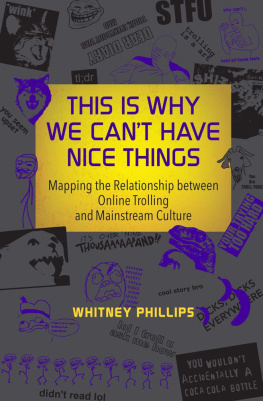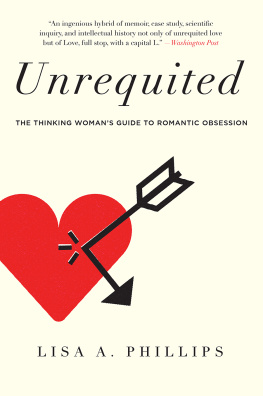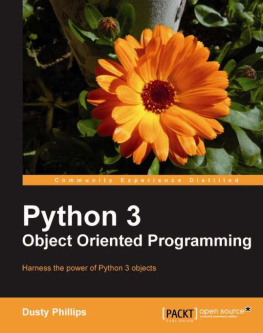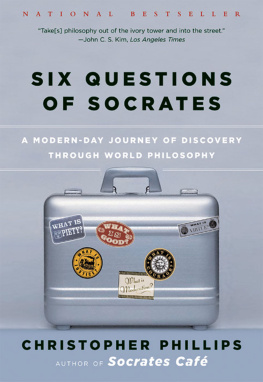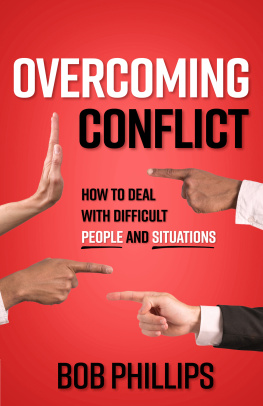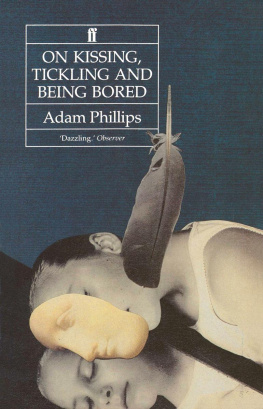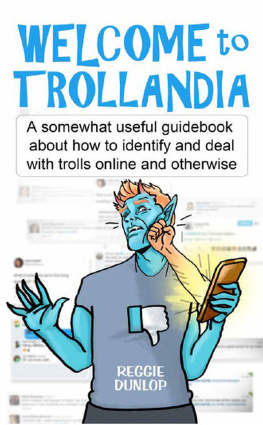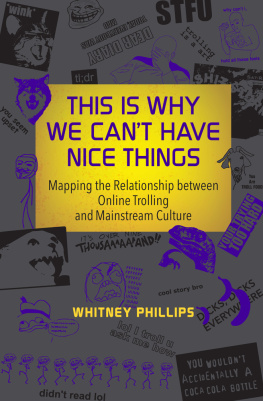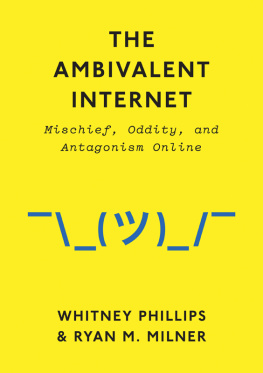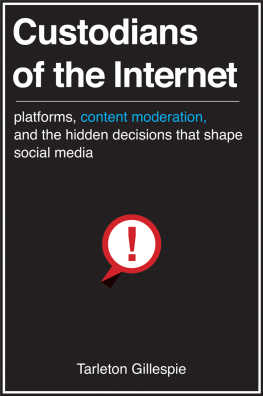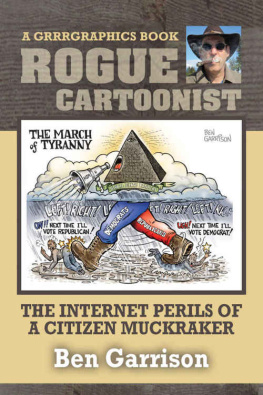Phillips - This is why we cant have nice things : mapping the relationship between online trolling and mainstream culture
Here you can read online Phillips - This is why we cant have nice things : mapping the relationship between online trolling and mainstream culture full text of the book (entire story) in english for free. Download pdf and epub, get meaning, cover and reviews about this ebook. City: Cambridge, Massachusetts, year: 2016, publisher: The MIT Press, genre: Politics. Description of the work, (preface) as well as reviews are available. Best literature library LitArk.com created for fans of good reading and offers a wide selection of genres:
Romance novel
Science fiction
Adventure
Detective
Science
History
Home and family
Prose
Art
Politics
Computer
Non-fiction
Religion
Business
Children
Humor
Choose a favorite category and find really read worthwhile books. Enjoy immersion in the world of imagination, feel the emotions of the characters or learn something new for yourself, make an fascinating discovery.
This is why we cant have nice things : mapping the relationship between online trolling and mainstream culture: summary, description and annotation
We offer to read an annotation, description, summary or preface (depends on what the author of the book "This is why we cant have nice things : mapping the relationship between online trolling and mainstream culture" wrote himself). If you haven't found the necessary information about the book — write in the comments, we will try to find it.
Internet trolls live to upset as many people as possible, using all the technical and psychological tools at their disposal. They gleefully whip the media into a frenzy over a fake teen drug crisis; they post offensive messages on Facebook memorial pages, traumatizing grief-stricken friends and family; they use unabashedly racist language and images. They take pleasure in ruining a complete strangers day and find amusement in their victims anguish. In short, trolling is the obstacle to a kinder, gentler Internet. To quote a famous Internet meme, trolling is why we cant have nice things online. Or at least thats what we have been led to believe. In this provocative book, Whitney Phillips argues that trolling, widely condemned as obscene and deviant, actually fits comfortably within the contemporary media landscape. Trolling may be obscene, but, Phillips argues, it isnt all that deviant. Trolls actions are born of and fueled by culturally sanctioned impulses -- which are just as damaging as the trolls most disruptive behaviors.
Phillips describes, for example, the relationship between trolling and sensationalist corporate media -- pointing out that for trolls, exploitation is a leisure activity; for media, its a business strategy. She shows how trolls, the grimacing poster children for a socially networked world, align with social media. And she documents how trolls, in addition to parroting media tropes, also offer a grotesque pantomime of dominant cultural tropes, including gendered notions of dominance and success and an ideology of entitlement. We dont just have a trolling problem, Phillips argues; we have a culture problem. This Is Why We Cant Have Nice Things isnt only about trolls; its about a culture in which trolls thrive.
This is why we cant have nice things : mapping the relationship between online trolling and mainstream culture — read online for free the complete book (whole text) full work
Below is the text of the book, divided by pages. System saving the place of the last page read, allows you to conveniently read the book "This is why we cant have nice things : mapping the relationship between online trolling and mainstream culture" online for free, without having to search again every time where you left off. Put a bookmark, and you can go to the page where you finished reading at any time.
Font size:
Interval:
Bookmark:
Tags: Online chat groups, moral aspects, ethical aspects, online identities, online etiquette, Internet, internet users, internet trolls
Internet trolls live to upset as many people as possible, using all the technical and psychological tools at their disposal. They gleefully whip the media into a frenzy over a fake teen drug crisis; they post offensive messages on Facebook memorial pages, traumatizing grief-stricken friends and family; they use unabashedly racist language and images. They take pleasure in ruining a complete strangers day and find amusement in their victims anguish. In short, trolling is the obstacle to a kinder, gentler Internet. To quote a famous Internet meme, trolling is why we cant have nice things online. Or at least thats what we have been led to believe. In this provocative book, Whitney Phillips argues that trolling, widely condemned as obscene and deviant, actually fits comfortably within the contemporary media landscape. Trolling may be obscene, but, Phillips argues, it isnt all that deviant. Trolls actions are born of and fueled by culturally sanctioned impulseswhich are just as damaging as the trolls most disruptive behaviors.
Phillips describes, for example, the relationship between trolling and sensationalist corporate mediapointing out that for trolls, exploitation is a leisure activity; for media, its a business strategy. She shows how trolls, the grimacing poster children for a socially networked world, align with social media. And she documents how trolls, in addition to parroting media tropes, also offer a grotesque pantomime of dominant cultural tropes, including gendered notions of dominance and success and an ideology of entitlement. We dont just have a trolling problem, Phillips argues; we have a culture problem. This Is Why We Cant Have Nice Things isnt only about trolls; its about a culture in which trolls thrive.
This Is Why We Can't Have Nice Things This Is Why We Can't Have Nice Things Mapping the Relationship between Online Trolling and Mainstream Culture Phillips, Whitney The MIT PressCambridge, Massachusetts
London, England 2015 Massachusetts Institute of Technology All rights reserved. No part of this book may be reproduced in any form by any electronic or mechanical means (including photocopying, recording, or information storage and retrieval) without permission in writing from the publisher. Library of Congress Cataloging-in-Publication Data Phillips, Whitney, 1983 This is why we cant have nice things : mapping the relationship between online trolling and mainstream culture / Whitney Phillips. pages cm.(The information society series) Includes bibliographical references and index. ISBN 978-0-262-02894-3 (hardcover : alk. paper) 1. Online chat groupsMoral and ethical aspects. 2. Online identitiesMoral and ethical aspects. 3. Online etiquetteSocial aspects. 4. InternetSocial aspects. 5. InternetMoral and ethical aspects. 6. Internet users. I. Title. ISBN 978-0-262-32900-2 (retail e-book) HM1169.P45 2015 302.23'1dc23 2014034232 10 9 8 7 6 5 4 3 2 1To J. S. Contents Acknowledgments Since beginning this research in 2008, Ive been surrounded by an incredible group of friends, family members, colleagues, and mentors. I am deeply grateful to everyone who contributed to the project and to all those who encouraged me throughout the process.I am particularly indebted to my parents Dennis and Carol Phillips (first set) and Sami and Steve Salvatori (second set) for their unconditional love and willingness to listen to me rattle on about trolls, lulz, and that which cannot be unseen on the Internet for the past six years. Also, sorry about that.Countless thanks to Chris Menning, Greg Leuch, Alex Leavitt, Tim Hwang, Mike Rugnetta, Frank Tobia, Erhardt Graeff, Seth Woodworth, Jamie Sherlock, Christina Xu, Stephen Bruckert, Jamie Wilkinson, Dharmishta Rood, Matt Morain, Don Caldwell, Amanda Brennan, Brad Kim, danah boyd, Alice Marwick, Tricia Wang, Danielle Citron, Kelly Bergstrom, Lee Knuttila, Luke Simcoe, Jiashan Wu, Sam Ford, Molly Sauter, Jessica Beyer, Brent Nash, Erik Markovs, Clint Springer, Austin Song, Josh Suyemoto, Natalie Morris, Hatty, Brian Psiropoulos, Lauren Bratslavsky, John Fenn, Daniel Wojcik, Monica Stephens, Stuart Geiger, and Katie OConnor for being thoughtful readers, respondents, and cheerleaders at various stages of the research project; Lynnika Butler, Karen Wade, and Kate Miltner for their heroic eleventh-hour edits; Gabriella Colemans Technological Underworlds class at McGill University for providing excellent and much-appreciated revision suggestions; my dissertation committee, which was composed of Carol Stabile, David Li, Doug Blandy, and Lisa Gilman, for their support and extraordinarily helpful comments; the anonymous reviewers through whose capable hands this manuscript has passed; Amanda Ford for coordinating the piles of letters and logistics Ive needed sorting over the years; the various trolls who participated in my research, most notably Paulie Socash, Peter Partyvan, Wilson Mouzone, Soveri Ruthless, Frank Bagadonuts, and Pro Fessor; everyone in the University of Oregons Folklore Program; the always helpful English Department office staff, with honorable mention going to the administrative oracle known to mortals as Michael Stamm; Maxwell Schnurer, chair of the Communication Department at Humboldt State University, for providing such amazing support in the run-up to this books publication; and of course the editorial, design, marketing, and legal wizards at the MIT Press, particularly former Senior Acquisitions Editor Marguerite Avery, former Assistant Acquisitions Editor Katie Persons, manuscript editor Kathleen Caruso, and jacket designer Molly Seamans for their enthusiasm and support, and for helping me noodle through all eight hundred thousand of my questions.As this book is the culmination of my undergraduate and graduate training, it is appropriatenecessary, evenfor me to thank the professors and mentors who have influenced me and my work most strongly: John Powell for challenging and enriching my understanding of academic argument; Jonathan Aaron for encouraging me to embrace a writing style that is wholly mine, and for upending my understanding of the traditional essay; Lisa Gilman for introducing me to ethnographic research methods, and for pushing me to think critically and carefully about the politics of trolling; Henry Jenkins for believing in me, and for providing generous and thoughtful critiques from the projects inception to the very last round of revisions; and Biella Coleman for the camaraderie, spot-on feedback and advice, and of course, for the lulz.I also offer my sincerest and most effusive thanks to Bryce Peake for the constant inappropriate laughter (bivtron, bunnies, and palm fronds, oh my) and for being my favorite part of graduate school; Shane Billings for the precious PLC memories and brutal line edits; Tony and Mrak Unger for being my family away from home; Chelsea Bullock for the cross-room eyebrow raisings (#spoilers); Katie Nash for her special oats; Maurene Goo for keeping the Boston legacy alive; Patrick Davison for being a frolicsome Internet .gif buddy and solid, kind, supportive friend (also Hi Michelle! Hi Doc!); Kate Miltner for the fireside cyberchats; Karen Wade for the blog parties (you had me at pineapple upside dump cake); Lynnika Butler for the surreptitious texting and beautiful wagon wheel light fixture; Ryan Milner for the various hats he wears, most importantly friend, coauthor, and Scully of merciless proportions; Hilary Maroney for her toughness, generosity, and uncanny ability to say the exact same thing at the exact same time, like were sisters or something (puuuublix); Cullen Maroney for appreciating our family jokes even when they arent normal (How do unique up on a rabbit?) and for being an all-around excellent addition to our lives; David Phillips for teaching me everything I know, and for giving the best wedding toast in the history of recorded marriage (Ive only met Whitney once, in 1986, in Miami, he began, despite the fact that he grew up with me, has never been to Miami, and was born in 1989); and Nathan, my young wolf, for helping me explore the forest trails, pushing me always to go further and faster, and at the same time reminding me to slow down and be present.Finally, to the unsinkable, incomparable, honeybadger of my life, my PhD advisor and hero Carol Stabile: I couldnt have written this book without you, full stop. You have supported, protected, and encouraged me in ways that have changed how I see and engage with the world, and your uncompromising feedback and fierce advocacy have provided me with a model for how I hope to advise my own students. I cannot tell you how lucky I feel to have worked with you, and how grateful I am for your friendship. Plus you made me that weird cake I like. You are amazing. Thank you. Introduction Project Origins I first encountered trolling in the summer of 2007, after my then eighteen-year-old brother recommended I spend some time on 4chans /b/ board, one of the Internets most infamous and active trolling hotspots. You should check it out, he kept insisting. Youll like it. Eventually I caved (how bad could it be?), and one fateful afternoon decided to see what all of the fuss was about. I parked myself in front of the computer, found my way to 4chans front page, and as my brother had instructed, clicked on the /b/-Random board. After ten minutes of scrolling through the seemingly infinite stream of nameless, faceless postsnearly everything I saw was attributed to AnonymousI was ready for a break. A break, a shower, and a nap. There was so much porn and gore, so much offensive, antagonistic humor, and so much general foulness I could hardly process what I was seeing. Nor could I understand why my brother, a smart, thoughtful, and generally easygoing kid, would find this space so amusing. Because what was even happening? What language were these posters speaking? And what, exactly, was a Pedobear?So one night I asked him, along with several of his friends who also frequented the site, a few basic questions. What kinds of people spent time on /b/? (Trolls and the trolls who troll them.) What do you mean by troll? (A troll is a person who likes to disrupt stupid conversations on the Internet. They have two basic rules: nothing should be taken seriously, and if it exists, there is porn of it.) Are trolls made, or are they born? (Yes.) What is the appeal of trolling? (Lulz.) And... what is that? (Amusement derived from another persons anger. Also the only reason to do anything.) The boys then began recounting their own trolling exploits, which they gleefully peppered with the same sharp, disorienting language Id encountered online. Who are you people, I remember asking, which only made them laugh harder.Needless to say, I was intrigued. I was also completely at a loss, and began writing my way into an explanation. One short project turned into another, which turned into another, which evolved into full-blown ethnographic research drawing from dozens of formal interviews and thousands of hours of participant observation. Ultimately, I decided to write an entire PhD dissertation on the subject, which I deposited with the University of Oregon in 2012. This book is an enhanced, expanded, and heavily revised version of that initial study.Before transitioning to the theoretical fruit of those labors, I would like to take a moment to clarify a few basic points. First, when I talk about trolls and trolling behaviors in this study, I do so with a very specific definition in mind: that of the self-identifying, subcultural troll. Chapter 1 addresses this point in much greater detail, but given the ubiquity of the word on the contemporary Internet, it is worth noting at the very outset that I will not be focusing on online aggression generally, cyberbullying specifically, or antagonistic online commentaryall of which are sometimes described as trolling. There is much to say about these behaviors (and the definitional fuzziness they engender), but that is not my focus here. My focus here is trolls who actively and enthusiastically identify as trolls, and who partake in highly stylized subcultural practices.The geographic scope of my project is also worth mentioning. Although sizable trolling populations exist in the United Kingdom, Australia, Germany, and Finland (interestingly, organized subcultural trolling is most popular in historically Anglo and Nordic regions), I havewith the exception of my analysis of Facebook memorial page trolling, which as Ill soon explain evolved into a global phenomenonchosen to restrict my analysis to U.S.-based trolling behaviors. This is not to say that American trolls are the only trolls worth studying; there is much work to be done on and with trolling populations outside the United States, particularly those in non-English-speaking countries. Given that trolling in the subcultural sense is steeped in American popular culture and reached critical mass on U.S.-based forums, however, the United States was an obvious place to start.A third and final point of orientationone that will go without saying for anyone familiar with trolling subcultureis that trolling can be nasty, outrageous business. That is, in fact, the entire exercise: to disrupt and upset as many people as possible, using whatever linguistic or behavioral tools are available. As this is a study of trolls and their linguistic and behavioral tools, readers can therefore expect to encounter a fair amount of NSFW (not safe for work) content, including expletives, sexual and scatological references, and accounts of shocking or otherwise threatening behaviors.This is a fine line to walk. Although a certain amount of offensive content is necessary to the coherence and in fact the accuracy of this study (it would not be possible to write a PG-rated history of trolling), I am simultaneously reluctant to uncritically replicate trolls racist, sexist, homophobic, and ablest output. Participatory media scholar Ryan Milner echoes similar concerns in his analysis of racism and misogyny in the troll space. Even if its done in the service of critical assessment, Milner writes, reproducing these discourses continues their circulation, and therefore may continue to normalize their antagonisms and marginalizations. In the attempt to minimize this outcome, I have chosen to print examples of problematic language and behavior only when its use provides foundational knowledge about the troll space, or when it helps illustrate a larger point. I recognize that even then, I will be further publicizing what is often quite repugnant content. Ultimately, however, I believe that an unflinching look at trolling subculture will yield better and more robust theoretical insights, not just about trolls, but about the cultural conditions out of which trolling emerges. Jenkem: The Hot New Drug for Americas Teens Keeping those basic points in mind, I will now turn to some legendary trolling lore, which in addition to introducing readers to the spirit of trolling humor, provides a textbook example of the surprising relationship between online trolling and mainstream culture. This particular story is known simply as Jenkem.The term Jenkem first appeared in 1998, in a New York Times article chronicling the struggles of AIDS-ravaged Zambia. Eventually Jenkem dislodged itself from its original context and began appearing on a number of shock forums, online spaces where anonymous or pseudonymous participants post the most offensive content possible, often as a punchline or grossest of the gross conversation stopper (or starter, depending on the audience). The story reappeared in 2007, when Pickwick, a user of a forum called Totse, uploaded a series of images chronicling his attempt to try Jenkem, including a picture of a half-full jug of waste labeled with the words Jenkem, Pickwick, and Totse, as well as Pickwick appearing to huff its contents.The subsequent Totse thread eventually made its way to 4chans /b/ board, a space already infamous for its aggressive, anonymous user base. From there, Totses narrative and images quickly began generating multiple iterations, including one copypasta post (text posed numerous times by numerous posters) imploring users to copy and paste the provided letter template, which would then be mailed to the principals of participants local high school(s). As that copypasta explained: Step 1: email this to school principal I am writing you anonymously because I do not want my child to get in any trouble, but I need to alert you to something your students are doing that is potentially very dangerous. Yesterday afternoon I came home early to find my son and his friends getting high on something called jenkem which they say they heard about at school. This jenkem is the most disgusting thing Ive ever heard of. They urinate and defecate in plastic bottles and leave them to ferment in the sun, then inhale the resulting gas. I know it sounds unreal but when I came home I found my son and his friends laying on the grass in the backyard and they were acting very strangely. There was a horrible, putrid smell in the air. I cant believe my son would do something like this. I looked it up on the internet and apparently this was something invented by African children that wound up online and now kids all over the world are doing it. My son says most of his friends at school have tried it. This seems to be a new thing and I cant find any information about the health effects of jenkemI think it is the methane and ammonia content that provides the desired high, but I dont really know. Both of those are very harmful chemicals. All sorts of diseases are spread through fecal matter. I imagine it could lead to some very serious health problems at your school. My wife and I are utterly shocked and talking about private school. We have spoken to our son about this and he says he wont do it anymore, but because it is on the internet kids all over the country are trying jenkem and they need to be educated about the health risks. It is only a matter of time before somebody dies from methane poisoning or this leads to a hepatitis outbreak. I dont know exactly what you could do about this as jenkem is legal but I needed to inform you of what some of your students are doing. Step 2: ??? Step 3: PROFIT According to the Jenkem entry on Encyclopedia Dramatica, the unofficial archive of trolling incidents and images, this particular copypasta appeared on the /b/ board on September 17, 2007.Despite Pickwicks confession and the fact that there was absolutely no evidence of pervasive (or any) Jenkem abuse in the United States, the media ran with the story. In November 2007, a local Fox affiliate in Florida (Fox 30) aired a news segment, as did a CBS affiliate out of Fort Meyers (WINK), both of which cited the Collier County Information Bulletin. Although Fox 30 was unable to find anyone who had ever even heard of the drug, Fox reporter Jack Miller implored parents to remain vigilant against the dangers posed by this so-called Human Waste Drug. Or as the kids were calling it, butt hash.Fox 30 and WINK werent the only outlets to take the bait. In the same article describing Pickwicks hoax, the unnamed Fox News writer expressed concern over Jenkems negative health effects, the availability of raw ingredients, and the legality of possessing said ingredients, which a DEA agent explained couldnt be regulated by the government because its feces and urine. Users of both Totse and 4chan were delighted by these developments, and the great Jenkem scare of 2007 entered the pantheon of successful trolling pranks.In addition to exemplifying trolls proclivity for gross-out bodily humor, the Jenkem story also showcases trolls facility with what they call media fuckery, essentially the ability to turn the media against itself. Trolls accomplish this goal by either amplifying or outright inventing a news item too sensational for media outlets to pass up. By reporting on the story (or nonstory, as the case may be), media outlets give the trolls what they want, namely, exposure and laughs, and participating media get what they want, namely, a story and eyeballs to commodify through advertisements. In this way, each camp ends up benefiting the other, a point of symbiosis I develop in subsequent chapters.Regarding the Jenkem story, the trolls approach was two-pronged. First, in order to lend legitimacy to their account, participating trolls chose a drug that was Google searchindexed, thus meeting the criterion of online verifiability. So, even if initially dubious, school administrators and/or law enforcement could quickly and easily confirm that Jenkem was indeed an African street drug. Or at least, that Jenkem had been reported as being an African street drug, by the New York Times and BBC no less. Second, by seeding the story with respectable members of the community, trolls engineered a second layer of plausibilitydespite the fact that there was no hard evidence suggesting that Jenkem was indeed the hot new drug for Americas teens. Under these conditions, how could the local news say no to butt hash?Given its silly, scatological undertones, some might be tempted to dismiss the Jenkem story as a meaningless prank, and participating trolls behaviors as aimless and immature. But this position would overlook the fact that the trolls knew exactly how to manipulate the news cycle, and in the process forwarded an implicit critique of the ways in which media research and report the news. Specifically, many outlets are so eager to present the latest, weirdest, and most sensational story that producers often fail to conduct even the most cursory background researchor worse, they do conduct the appropriate background research, but choose to run misleading segments anyway. Journalists have deadlines to meet, after all, and are working under increasing pressure to maintain their audience in an oversaturated market. Trolls successful manipulation of the news cycle drives this point home, thereby challenging the assumption that the Jenkem story can or should be dismissed as inconsequential mischief. The Political Significance of Trolling? Just as it would be a mistake to dismiss participating trolls behaviors as politically meaningless, the impulse to posit clear political meaning is similarly misguided, both in relation to the Jenkem story and trolling generally. First of all, there is far too much variation within the behavioral category of trolling (even within the same raiding party) to affix any singular, unified purpose to constituent trolls actions. Furthermore, the assertion that a given act of trolling is inherently political, or even politically motivated, suggests that a specific argument or politics is the trolls intended outcome. Given trolls anonymity, this assumption simply isnt verifiable. Of course this doesnt mean that specific instances of trolling cant be political, or that individual trolls cant be politically motivated. It just means that outside observers cant be sure if and when it happens.Whether or not trolls deliberately forward political or cultural critiques, however, political or cultural critiques can be extrapolated from the trolls behaviors. Take the Jenkem story. Participating trolls may or may not have been looking to expose sloppy journalistic standards; regardless, sloppy journalistic standards were exposed. An argument was made, in other words, regardless of what participating trolls intended to accomplish. I build upon this basic argumentthat trolls behaviors provide an implicit, and sometimes outright explicit, critique of existing media and cultural systemsin later chapters. For now, its enough to say that there is much more to trolling than simple shenanigans, even if the behaviors complicate (or even outright defy) traditional notions of political action.In addition to challenging overly simplistic explanations of trolling behaviors, trolls ability to generate meaningful discourse provides a preemptive answer to the question Why study trolls? First, trolls various and sundry transgressionsagainst specific individuals, organizations, local, state, and national governments, and civil society generallycall attention to dominant cultural mores, a process that echoes anthropologist Mary Douglass exploration of the related concepts of dirt and taboo. According to Douglas, dirt is best understood as matter out of place, and is intelligible only in relation to existing systems of cleanliness: you cant talk or even think about dirt unless youve already internalized some sense of what qualifies as clean. Similarly, cultural aberration is only intelligible in the context of an existing social system. Thus by examining that which is regarded as transgressive within a particular culture or community, one is able to reconstruct the values out of which problematic behaviors emerge. Trolls behaviors, which are widely condemned as being bad, obscene, and wildly transgressive, therefore allow one to reconstruct what the dominant culture regards as good, appropriate, and normal.Of course, the demarcation between good and bad (to say nothing of normal and abnormal) is never so straightforward in practice. Trolls provide a striking example, and through their more outrageous behaviors call attention to the various points of overlap between negative and positive, transgressive and acceptable, even cruel and just behavior. Put simply, the more carefully one examines trolling, the more one struggles to differentiate this ostensibly abnormal, deviant pursuit from pursuits that are (or at least appear to be) so natural, necessary, and downright normal that most people assume things couldnt be otherwise.This study will explore these moments of slippage, and in the process will challenge the seemingly clear-cut distinction between those who troll and those who do not. My first argumentative plank is that, within the postmillennial digital media landscape of the United States, trolls reveal the thin and at times nonexistent line between trolling and sensationalist corporate media. The primary difference is that, for trolls, exploitation is a leisure activity. For corporate media, its a business strategy. Because they dont have to take censors or advertisers into account, trolls behaviors are often more conspicuously offensive, and more conspicuously exploitative. But often not by much. And unlike the media outlets that run sensationalist, racist, and exploitative content, trolling behaviors arent rewarded with a paycheck.Trolls also fit very comfortably within the contemporary, hypernetworked digital media landscape. Not only do they put Internet technologies to expert and highly creative use, their behaviors are often in direct (if surprising) alignment with social media marketers and other corporate interests. Furthermore they are quite skilled at navigating and in fact harnessing the energies created when politics, history, and digital media collide. In short, rather than functioning as a counterpoint to correct online behavior, trolls are in many ways the grimacing poster children for the socially networked world.Thats not the only overlap between trolling and the mainstream. In addition to parroting digital and terrestrial media tropes, trolls are engaged in a grotesque pantomime of dominant cultural tropes. Not only does the act of trolling replicate gendered notions of dominance and successmost conspicuously expressed through the adversary method, Western philosophys dominant rhetorical paradigmit also exhibits a profound sense of entitlement, one spurred by expansionist and colonialist ideologies. Further, trolling embodies precisely the values that are said to make America the greatest and most powerful nation on earth, with particular emphasis placed on the pursuit of life, liberty, and of course the freedom of expression.Again, this is not to suggest that trolls deliberately forward such an argument. Nor is it to suggest that trolls would necessarily agree with my conclusions. Rather than hinging on trolls true motivations, or more problematically on their approval, my argument hinges on what trolls behaviors unearth. And what trolls behaviors unearth places them in unexpected mythological company. Trolls as Tricksters In Trickster Makes This World: How Disruptive Imagination Creates Culture , Lewis Hyde examines the trickster archetype, focusing specifically on the stories of Hermes, Coyote, and Krishna.As evidence of tricksters latent (if unwitting) perspicacity, Hyde tells a story about the Indian god Krishna. A particularly mischievous young god, Krishna is quick to develop an interest in the village maidens. One night, he takes a walk into the woods and begins playing a magical flute. All the women who hear Krishnas song are mesmerized and follow its call into the forest, where they begin to dance. Krishna then multiplies himself by sixteen thousand and has sex with each woman. Having had his way with his still-bewitched conquests (the sexually assaultive nature of which is apparently par for the culture-hero course), Krishna disappears with the sunrise.According to Hyde, this moment captures the negating strain inherent in tricksters behavior. He rejects laws of propriety, but doesnt attempt to replace these laws with some other set. As Hyde maintains, [trickster] is not the declarative speaker of traditional prophecy, but an erasing angel who cancels what humans have so carefully built, then cancels himself.As Gabriella Coleman has noted, there is a great deal of behavioral overlap between trolls and mythological trickster. Of course, this is not to say that trolls are tricksters, at least not in the culture-hero, mythological sense. First, and most obviously, trickster is a character created by humans to help explain and order the universe, while trolls are all too real, perhaps obscured by the mask of trolling but people nonetheless. Moreover, however crude or amoral trickster might appear, the trickster tale genre presumes moral order, making trickster a pawn in a very specific cultural ethos. Trolls on the other hand actively embrace amorality, and are, or at least profess to be, pawns in the service of nothing but their own amusement.These practical differences aside, trolls harness similar means as trickster, resulting in similar ends. Specifically, trolls are agents of cultural digestion ; they scavenge the landscape for scraps of usable content, make a meal of the most pungent bits, then hurl their waste onto an unsuspecting populaceafter which they disappear, their Cheshire cat grins trailing after them like puffs of smoke. They may not know it, they may not intend to, but deliberately or not, these grotesque displays reveal a great deal about the surrounding cultural terrain. What they reveal isnt always pleasant. In fact it is often quite upsetting, sometimes because the trolls behaviors are upsetting, sometimes because what their behaviors reveal is upsetting, and sometimes both.The ultimate takeaway point of this analysis is that, while trolling behaviors might fall on the extreme end of the cultural spectrum, the most exceptional thing about trolling is that its not very exceptional . Its built from the same stuff as mainstream behaviors; the difference is that trolling is condemned, while ostensibly normal behaviors are accepted as a given, if not actively celebrated.This idea, that trolling behaviors are similar in form and function to normal behaviors, is hardly a popular or immediately obvious position. Much more popular, and infinitely more obvious, is the assertion that trolls are why we cant have nice things online, a nod to a well-known image macro featuring a hissing gray cat. (Image macros, also known simply as macros, are images captioned with lines of text. Typically, one line of text is placed at the top of the image and another line is placed along the bottom, though the format can vary depending on the image and message conveyed) (figure 0.1).The analogy between arguecat, as the macro is called, and trolling is apt. Like a spiteful housecat whose sole interest seems to be property damage, trolls take perverse joy in ruining complete strangers days. They will do and say absolutely anything to accomplish this objective, and in the service of these nefarious ends deliberately target the most vulnerableor as the trolls would say, exploitabletargets. Consequently, and understandably, trolls are widely regarded as the primary obstacle to a kinder, gentler, and more equitable Internet.
 Next page
Next pageFont size:
Interval:
Bookmark:
Similar books «This is why we cant have nice things : mapping the relationship between online trolling and mainstream culture»
Look at similar books to This is why we cant have nice things : mapping the relationship between online trolling and mainstream culture. We have selected literature similar in name and meaning in the hope of providing readers with more options to find new, interesting, not yet read works.
Discussion, reviews of the book This is why we cant have nice things : mapping the relationship between online trolling and mainstream culture and just readers' own opinions. Leave your comments, write what you think about the work, its meaning or the main characters. Specify what exactly you liked and what you didn't like, and why you think so.

